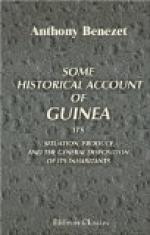[Footnote A: F. Moor, 28.]
It was in these parts of Guinea, that M. Adanson, correspondent of the Royal Academy of Sciences at Paris, mentioned in some former publications, was employed from the year 1749, to the year 1753, wholly in making natural and philosophical observations on the country about the rivers Senegal and Gambia. Speaking of the great heats in Senegal, he says,[A] “It is to them that they are partly indebted for the fertility of their lands; which is so great, that, with little labour and care, there is no fruit nor grain but grow in great plenty.”
[Footnote A: M. Adanson’s voyage to Senegal, &c, page 308.]
Of the soil on the Gambia, he says,[A] “It is rich and deep, and amazingly fertile; it produces spontaneously, and almost without cultivation, all the necessaries of life, grain, fruit, herbs, and roots. Every thing matures to perfection, and is excellent in its kind."[B] One thing, which always surprized him, was the prodigious rapidity with which the sap of trees repairs any loss they may happen to sustain in that country: “And I was never,” says he, “more astonished, than when landing four days after the locusts had devoured all the fruits and leaves, and even the buds of the trees, to find the trees covered with new leaves, and they did not seem to me to have suffered much."[C] “It was then,” says the same author; “the fish season; you might see them in shoals approaching towards land. Some of those shoals were fifty fathom square, and the fish crowded together in such a manner, as to roll upon one another, without being able to swim. As soon as the Negroes perceive them coming towards land, they jump into the water with a basket in one hand, and swim with the other. They need only to plunge and to lift up their basket, and they are sure to return loaded with fish.” Speaking of the appearance of the country, and of the disposition of the people, he says,[D] “Which way soever I turned mine eyes on this pleasant spot, I beheld a perfect image of pure nature; an agreeable solitude, bounded on every side by charming landscapes; the rural situation of cottages in the midst of trees; the ease and indolence of the Negroes, reclined under the shade of their spreading foliage; the simplicity of their dress and manners; the whole revived in my mind the idea of our first parents, and I seemed to contemplate the world in its primitive state. They are, generally speaking, very good-natured, sociable, and obliging. I was not a little pleased with this my first reception; it convinced me, that there ought to be a considerable abatement made in the accounts I had read and heard every where of the savage character of the Africans. I observed both in Negroes and Moors, great humanity and sociableness, which gave me strong hopes that I should be very safe amongst them, and meet with the success I desired in my enquiries after the curiosities of the country."[E] He was agreeably




